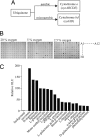Host cell-free growth of the Q fever bacterium Coxiella burnetii
- PMID: 19246385
- PMCID: PMC2657411
- DOI: 10.1073/pnas.0812074106
Host cell-free growth of the Q fever bacterium Coxiella burnetii
Abstract
The inability to propagate obligate intracellular pathogens under axenic (host cell-free) culture conditions imposes severe experimental constraints that have negatively impacted progress in understanding pathogen virulence and disease mechanisms. Coxiella burnetii, the causative agent of human Q (Query) fever, is an obligate intracellular bacterial pathogen that replicates exclusively in an acidified, lysosome-like vacuole. To define conditions that support C. burnetii growth, we systematically evaluated the organism's metabolic requirements using expression microarrays, genomic reconstruction, and metabolite typing. This led to development of a complex nutrient medium that supported substantial growth (approximately 3 log(10)) of C. burnetii in a 2.5% oxygen environment. Importantly, axenically grown C. burnetii were highly infectious for Vero cells and exhibited developmental forms characteristic of in vivo grown organisms. Axenic cultivation of C. burnetii will facilitate studies of the organism's pathogenesis and genetics and aid development of Q fever preventatives such as an effective subunit vaccine. Furthermore, the systematic approach used here may be broadly applicable to development of axenic media that support growth of other medically important obligate intracellular pathogens.
Conflict of interest statement
The authors declare no conflict of interest.
Figures




References
-
- Derrick EH. “Q” fever, a new fever entity: Clinical features, diagnosis and laboratory investigation. Med J Aust. 1937;2:281–298. - PubMed
-
- Cox HR. A filter-passing infectious agent isolated from ticks. Description of organism and cultivation experiments. Public Health Rep. 1938;53:2270–2276.
Publication types
MeSH terms
Substances
Associated data
- Actions
Grants and funding
LinkOut - more resources
Full Text Sources
Other Literature Sources
Molecular Biology Databases

